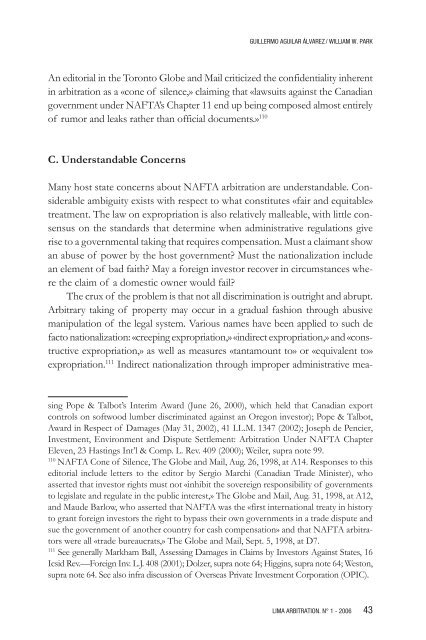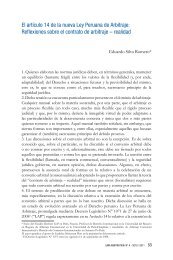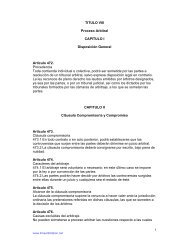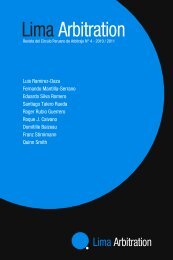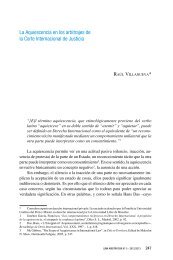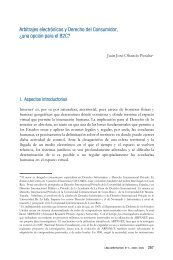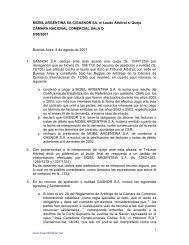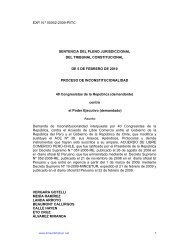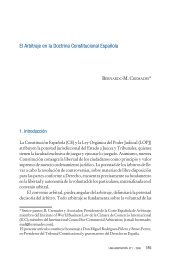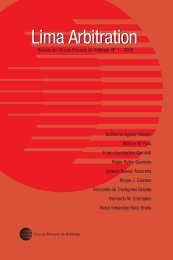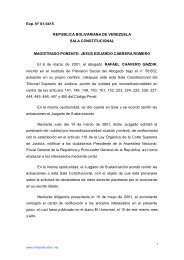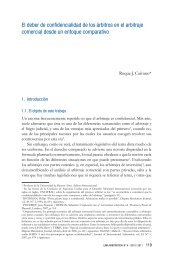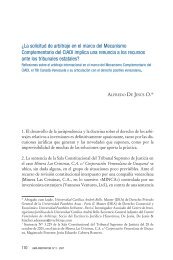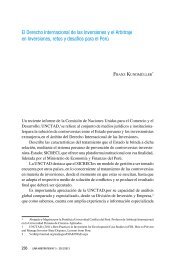Lima Arbitration
Lima Arbitration
Lima Arbitration
Create successful ePaper yourself
Turn your PDF publications into a flip-book with our unique Google optimized e-Paper software.
GUILLERMO AGUILAR ÁLVAREZ / WILLIAM W. PARK<br />
An editorial in the Toronto Globe and Mail criticized the confidentiality inherent<br />
in arbitration as a «cone of silence,» claiming that «lawsuits against the Canadian<br />
government under NAFTA’s Chapter 11 end up being composed almost entirely<br />
of rumor and leaks rather than official documents.» 110<br />
C. Understandable Concerns<br />
Many host state concerns about NAFTA arbitration are understandable. Considerable<br />
ambiguity exists with respect to what constitutes «fair and equitable»<br />
treatment. The law on expropriation is also relatively malleable, with little consensus<br />
on the standards that determine when administrative regulations give<br />
rise to a governmental taking that requires compensation. Must a claimant show<br />
an abuse of power by the host government? Must the nationalization include<br />
an element of bad faith? May a foreign investor recover in circumstances where<br />
the claim of a domestic owner would fail?<br />
The crux of the problem is that not all discrimination is outright and abrupt.<br />
Arbitrary taking of property may occur in a gradual fashion through abusive<br />
manipulation of the legal system. Various names have been applied to such de<br />
facto nationalization: «creeping expropriation,» «indirect expropriation,» and «constructive<br />
expropriation,» as well as measures «tantamount to» or «equivalent to»<br />
expropriation. 111 Indirect nationalization through improper administrative measing<br />
Pope & Talbot’s Interim Award (June 26, 2000), which held that Canadian export<br />
controls on softwood lumber discriminated against an Oregon investor); Pope & Talbot,<br />
Award in Respect of Damages (May 31, 2002), 41 I.L.M. 1347 (2002); Joseph de Pencier,<br />
Investment, Environment and Dispute Settlement: <strong>Arbitration</strong> Under NAFTA Chapter<br />
Eleven, 23 Hastings Int’l & Comp. L. Rev. 409 (2000); Weiler, supra note 99.<br />
110<br />
NAFTA Cone of Silence, The Globe and Mail, Aug. 26, 1998, at A14. Responses to this<br />
editorial include letters to the editor by Sergio Marchi (Canadian Trade Minister), who<br />
asserted that investor rights must not «inhibit the sovereign responsibility of governments<br />
to legislate and regulate in the public interest,» The Globe and Mail, Aug. 31, 1998, at A12,<br />
and Maude Barlow, who asserted that NAFTA was the «first international treaty in history<br />
to grant foreign investors the right to bypass their own governments in a trade dispute and<br />
sue the government of another country for cash compensation» and that NAFTA arbitrators<br />
were all «trade bureaucrats,» The Globe and Mail, Sept. 5, 1998, at D7.<br />
111<br />
See generally Markham Ball, Assessing Damages in Claims by Investors Against States, 16<br />
Icsid Rev.—Foreign Inv. L.J. 408 (2001); Dolzer, supra note 64; Higgins, supra note 64; Weston,<br />
supra note 64. See also infra discussion of Overseas Private Investment Corporation (OPIC).<br />
LIMA ARBITRATION. N° 1 - 2006 43


